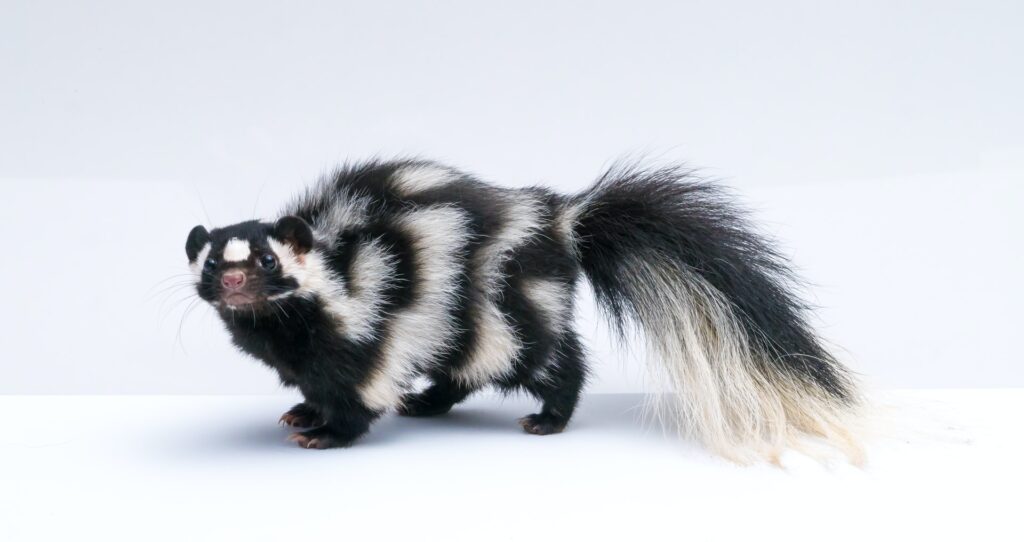Scram the Skunk has a far poorer reputation than he deserves. The first thing most people think of when they think of skunks is their extremely pungent spray. We all cringe when we smell the stench of one of these critters dying on the side of the road. Anyone who owns an active and inquisitive dog has most definitely met the pungent fragrance that lingers much too long on fur, no matter how much wash is used.
In reality, these black-and-white creatures are more timid than aggressive. Their defense system is unpleasant to your senses, but it poses no genuine harm. Skunks do not want to hurt humans or dogs, but when confronted, they will not hesitate to elevate their tails and take aim. Even yet, having one live on your property is generally unwanted, especially if you have dogs that spend time outside.
Which Environments Prefer Skunks?
Skunks like dense forests with plenty of food and shelter. Their claws are ideal for excavating burrows in the forest floor, and they prefer to do it in areas with extra safety, like as behind a fallen tree. Never one to pass up an opportunity, these animals have no problem evicting smaller burrow dwellers and taking the tunnels for themselves.
Except for breeding females that stay with their young for months, skunks are solitary creatures. In the winter, though, it is customary for people to gather in dens to stay warm. Scram and his ilk forage alone, looking for anything appetizing. These omnivores eat anything from flowers to frogs and everything in between. They can go up to 1.5 kilometers from their cave in search of food, although they prefer to stay close to home. Predators and a lack of food are two factors that drive a skunk to seek out new territory.
Which Environments Prefer Skunks?
Although a good, healthy forest is a skunk’s ideal home, people have encroached on and ruined natural areas, requiring forest residents to adapt in order to live. Because these creatures are omnivores, their diet might include things that they would not find in the forest. Unfortunately, this includes human waste. One of the biggest draws for an urban skunk is your rubbish. They will also not pass up a tasty dish of pet chow. They are quite good at getting into containers and sacks.
The availability of decent shelter is the second factor that makes your location appealing. Skunks are more inclined to settle in the winter since the frozen ground makes digging difficult and food is more difficult to get by. The houseguests under your deck are likely to stay all winter, sleeping for weeks on end and only rising to look for food. If your home continues to provide secure refuge and convenient feeding sources, they may stay far into the spring.
What Should You Do If A Skunk Is Residing Beneath Your Shed Or Deck?
Be patient while dealing with a mother skunk.
The first choice is to do nothing. Skunks often spend brief amounts of time in dens. By the end of the summer, skunk babies are self-sufficient, leaving the den and dispersing from their parental group. You can lock up the entrance point to prevent other animals from utilizing the den in the future if you can wait until the babies are grown and/or have departed.

What You Can Do to Keep Skunks Away?
Skunks visit your house in search of two things: food and refuge. Keeping them at bay entails depriving them of these two need. Skunks are drawn to a wide variety of foods. They will rummage through your garbage, steal from bird feeders, and scavenge for fallen nuts and fruits. When not in use, keep the lid of your garbage can secured down. Keep trash outside only when it is in a dumpster and sealed in a plastic bag. Keep bird seed, nuts, and fruits from accumulating up in your yard where skunks can get to them. It’s a little more difficult to discourage skunks from locating a safe haven near your house.
Skunks are excellent diggers despite their inability to climb. You could buy barriers to put around your porch or deck, but they would have to be buried. Skunks are especially drawn to regions where the entrance to their tunnels is hidden. Trimming bushes and shrubs around your home’s perimeter may make it less appealing to would-be burrowers. Skunks are eventually unfairly maligned. They are not out to injure or inconvenience you; they are simply attempting to survive.
We’re not suggesting you should feel awful about keeping them out of your house. It is beneficial for everyone if skunk and human houses are kept separate. Particularly your nose. If you ever have a grouchy, stinky neighbor (or a skunk! ), remember that you can always contact Varment Guard for help. We’ll make certain that your skunk problems are securely and properly resolved, and that you leave smelling like a rose.
Trapping of live animals
Trapping and transferring a skunk may appear to be the “humane” choice, but it isn’t. When skunks are relocated away from their home region, they rarely survive. Relocated mother skunks abandon their offspring, leaving them orphaned without a mother to care for them. When presented with a new, unknown region, a mother skunk moved with her kids will most likely leave them. It is forbidden in Ontario to remove any wild animal more than one kilometer from where it was discovered.
Every year, the Toronto Wildlife Centre receives hundreds of complaints concerning baby skunks that were orphaned after their mother was captured and transferred by well-meaning humans. Unfortunately, we lack the means to care for all of them.
Single-way doors
Many humane removal businesses would advise installing one-way doors so the skunk can go but not return. Between September and December, when small baby skunks are rare and the earth is still thawed enough for a skunk to dig a new home, one-way doors are a suitable alternative. Between April and September, one-way doors can keep a mother skunk out while trapping baby skunks within; throughout the winter, a skunk evicted in this fashion may be unable to find or dig a new lair. Before erecting a one-way door, make sure the young skunks are old enough to be active and following their mother, and avoid doing so during the coldest months.





